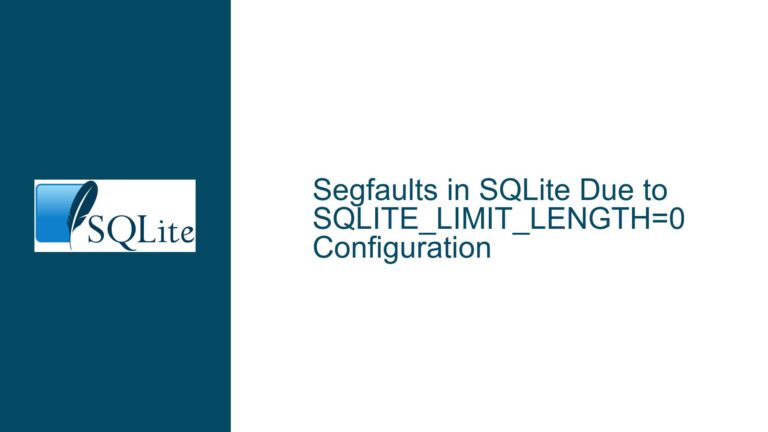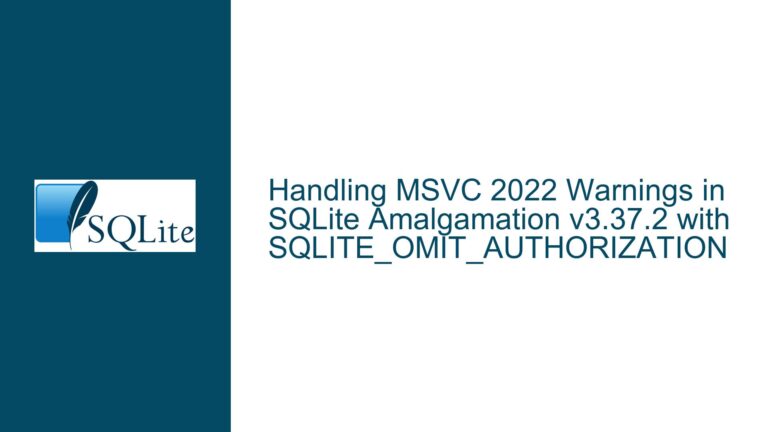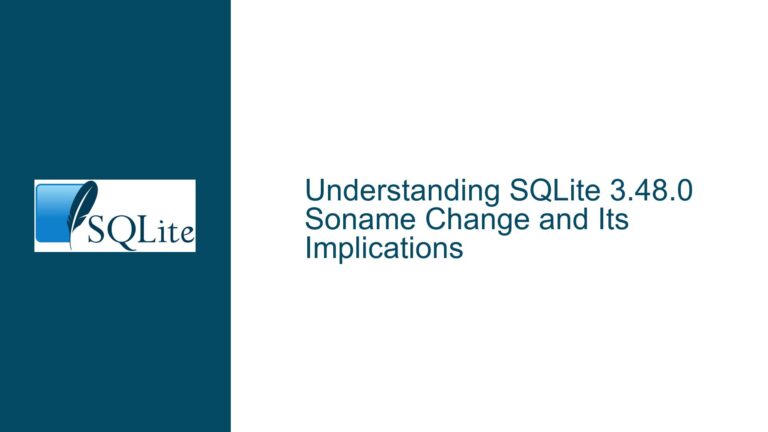Memory Leak in sqlite3PagerOpen Due to Incorrect Free Condition
Memory Allocation and Free Logic in sqlite3PagerOpen
The issue at hand revolves around a potential memory leak in the SQLite library, specifically within the sqlite3PagerOpen function. This function is responsible for initializing a pager object, which is a critical component in SQLite’s architecture for managing database file pages, including reading, writing, and caching operations. The memory leak occurs due to an incorrect condition used to determine whether a dynamically allocated memory block should be freed.
In the sqlite3PagerOpen function, memory is allocated for the zPathname variable, which stores the pathname of the database file. The allocation happens when the virtual filesystem (VFS) implementation’s xFullPathname method is called. However, if the xFullPathname method does nothing and simply returns SQLITE_OK, the zPathname variable may remain uninitialized or set to NULL. Despite this, the subsequent code attempts to free the memory based on the value of nPathname, which represents the length of the pathname. The condition for freeing the memory checks whether nPathname is non-zero, but it should instead verify whether zPathname is non-NULL. This discrepancy can lead to a memory leak if zPathname is NULL but nPathname is non-zero.
The memory allocation occurs in the following code segment:
zPathname = sqlite3DbMallocRaw(0, nPathname);
Here, sqlite3DbMallocRaw is used to allocate memory for zPathname. The function takes two arguments: the first is the database connection handle (which is 0 in this case, indicating that the memory is not associated with a specific database connection), and the second is the number of bytes to allocate. If nPathname is non-zero, memory is allocated, and zPathname points to the allocated block. However, if nPathname is zero, zPathname remains NULL.
The memory is intended to be freed later in the function using the following code:
if( nPathname ) sqlite3DbFree(0, zPathname);
The condition if( nPathname ) checks whether nPathname is non-zero. If true, sqlite3DbFree is called to free the memory pointed to by zPathname. However, this condition is flawed because it does not account for the possibility that zPathname might be NULL even if nPathname is non-zero. This can happen if the xFullPathname method does not initialize zPathname but returns SQLITE_OK, leaving zPathname as NULL. In such a case, the memory is not freed, leading to a memory leak.
Implications of Incorrect Memory Free Logic
The incorrect memory free logic in sqlite3PagerOpen can have several implications, particularly in scenarios where the virtual filesystem implementation does not properly initialize the zPathname variable. When zPathname is NULL but nPathname is non-zero, the memory allocated for zPathname is not freed, resulting in a memory leak. Over time, this can lead to increased memory usage, especially in applications that frequently open and close database connections or perform many operations that involve the pager.
Memory leaks are particularly problematic in long-running applications or those with limited memory resources, such as embedded systems. In such environments, even small memory leaks can accumulate and eventually cause the application to run out of memory, leading to crashes or degraded performance. Additionally, memory leaks can complicate debugging and maintenance, as they may not be immediately apparent and can manifest only after the application has been running for some time.
The issue is exacerbated by the fact that the sqlite3PagerOpen function is a low-level component of SQLite, and memory leaks at this level can have cascading effects on higher-level operations. For example, if the pager fails to properly manage memory, it can lead to inefficient caching, increased I/O operations, and overall reduced database performance. Furthermore, memory leaks in the pager can interfere with SQLite’s transaction management, potentially leading to data corruption or loss in extreme cases.
Correcting the Memory Free Condition
To address the memory leak in sqlite3PagerOpen, the condition for freeing the zPathname memory should be modified to check whether zPathname is non-NULL instead of checking whether nPathname is non-zero. This ensures that the memory is freed only if it was actually allocated, regardless of the value of nPathname.
The corrected code segment should look like this:
if( zPathname ) sqlite3DbFree(0, zPathname);
By changing the condition to if( zPathname ), the code now correctly checks whether zPathname points to an allocated memory block. If zPathname is NULL, the sqlite3DbFree function is not called, preventing any attempt to free a NULL pointer, which is safe and well-defined in C. This change ensures that memory is properly managed and prevents the memory leak described in the issue.
In addition to correcting the memory free condition, it is also important to ensure that the xFullPathname method in the virtual filesystem implementation properly initializes the zPathname variable. If xFullPathname does not set zPathname, it should either return an error code or explicitly set zPathname to NULL to avoid ambiguity. This helps maintain consistency in the memory management logic and prevents potential issues in other parts of the code that rely on the zPathname variable.
Testing and Validation
After implementing the correction, it is crucial to thoroughly test the modified code to ensure that the memory leak is resolved and that no new issues are introduced. Testing should include scenarios where the xFullPathname method does not initialize zPathname, as well as cases where it properly sets the variable. Additionally, the tests should cover various usage patterns, such as opening and closing database connections, performing transactions, and executing queries, to verify that the pager operates correctly under different conditions.
One effective testing approach is to use memory analysis tools, such as Valgrind or AddressSanitizer, to detect memory leaks and other memory-related issues. These tools can help identify any remaining memory leaks or invalid memory accesses that may have been introduced by the changes. Running the SQLite test suite with these tools enabled can provide comprehensive coverage and ensure that the modifications do not adversely affect the library’s functionality.
In addition to automated testing, manual code review is essential to verify that the changes are correctly implemented and that they align with SQLite’s coding standards and best practices. Reviewing the code with a focus on memory management and error handling can help catch any subtle issues that automated tools might miss. Collaborating with other developers or seeking feedback from the SQLite community can also provide valuable insights and help ensure the robustness of the solution.
Conclusion
The memory leak in sqlite3PagerOpen is a subtle but significant issue that can lead to increased memory usage and potential performance degradation in SQLite-based applications. The root cause of the leak lies in the incorrect condition used to determine whether the zPathname memory should be freed. By modifying the condition to check whether zPathname is non-NULL, the memory leak can be effectively resolved.
In addition to correcting the memory free logic, it is important to ensure that the virtual filesystem implementation properly initializes the zPathname variable and to thoroughly test the modified code to verify its correctness. Using memory analysis tools and conducting manual code reviews can help identify and address any remaining issues, ensuring that the pager operates efficiently and reliably.
By addressing this memory leak, developers can improve the stability and performance of their SQLite-based applications, particularly in resource-constrained environments where memory management is critical. The correction also highlights the importance of careful memory management in low-level components of software libraries, where even small oversights can have significant consequences.






